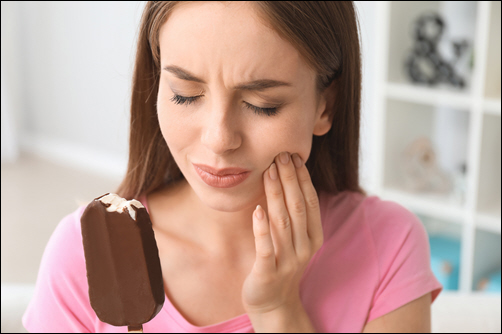Sensitive teeth can turn daily activities like eating, drinking, and brushing into uncomfortable experiences. Tooth sensitivity occurs when the enamel, the protective layer of your teeth, wears down or when gums recede, exposing the softer dentin underneath. This exposure allows external stimuli, like hot, cold, sweet, or acidic foods and drinks, to reach the nerves inside the tooth, resulting in sharp, sudden pain. Fortunately, with proper care and preventive measures, you can manage sensitive teeth and reduce the discomfort.
Causes of Tooth Sensitivity
 Several factors contribute to tooth sensitivity:
Several factors contribute to tooth sensitivity:
- Enamel Erosion: Acidic foods and drinks like soda, citrus, and wine can erode enamel, making teeth more vulnerable to sensitivity.
- Aggressive Brushing: Brushing too hard or using a hard-bristled toothbrush can wear down enamel and push back gum tissue, exposing sensitive areas.
- Gum Recession: Receding gums expose the roots of teeth, which lack the protective enamel layer, increasing sensitivity.
- Teeth Grinding (Bruxism): Grinding or clenching wears down enamel, leading to increased sensitivity over time.
- Dental Treatments: Procedures like teeth whitening, fillings, or crowns may temporarily increase sensitivity as your teeth adjust.
Preventing Tooth Pain from Sensitivity
If you’re experiencing sensitive teeth, making changes to your daily routine can help alleviate the pain and protect your teeth from further discomfort.
- Use a Soft-Bristled Toothbrush: Switch to a soft-bristled toothbrush and practice gentle brushing techniques. Hold your brush at a 45-degree angle to your gums and use small, circular motions instead of hard scrubbing. A soft brush minimizes the risk of enamel wear and gum irritation.
- Choose Toothpaste for Sensitive Teeth: Desensitizing toothpaste is specially formulated to block pain signals in exposed nerves. Look for toothpaste with potassium nitrate or stannous fluoride, ingredients proven to reduce sensitivity. Brush twice daily with this toothpaste, and you should start noticing relief within a few weeks.
- Limit Acidic Foods and Drinks: Reducing your intake of acidic foods and beverages can help prevent enamel erosion. If you do consume something acidic, drink water afterward or rinse your mouth to help neutralize acids. Avoid brushing your teeth immediately after consuming acidic foods, as this can wear down softened enamel.
- Avoid Teeth Grinding: If you grind your teeth at night, talk to your dentist about a custom night guard to protect your teeth. A night guard cushions your teeth and reduces the risk of enamel wear caused by grinding, which is a common cause of sensitivity.
- Practice Good Oral Hygiene: Brush and floss daily to prevent gum disease and recession, both of which can expose sensitive areas. Maintaining healthy gums helps protect the roots of your teeth and reduce sensitivity.
- Rinse with Fluoride Mouthwash: Fluoride helps strengthen enamel and protect against decay. Rinsing with a fluoride mouthwash daily can help reduce sensitivity by reinforcing weakened enamel and providing extra protection for your teeth.
Call Us for a Consultation About Persistent Sensitivity
If sensitivity persists or worsens, consult your Bridge Street Dental Center dentist. There may be underlying issues like decay, a cracked tooth, or gum disease contributing to the pain. Your dentist can recommend in-office treatments like fluoride varnishes, bonding agents, or even gum grafts for more severe cases, providing relief and protecting your teeth.
Tooth sensitivity doesn’t have to disrupt your life. By following these preventive measures, you can protect your enamel, care for your gums, and enjoy food and drink without the sharp pain associated with sensitive teeth. Regular dental check-ups and a proactive approach to oral care ensure your smile remains healthy and pain-free.

